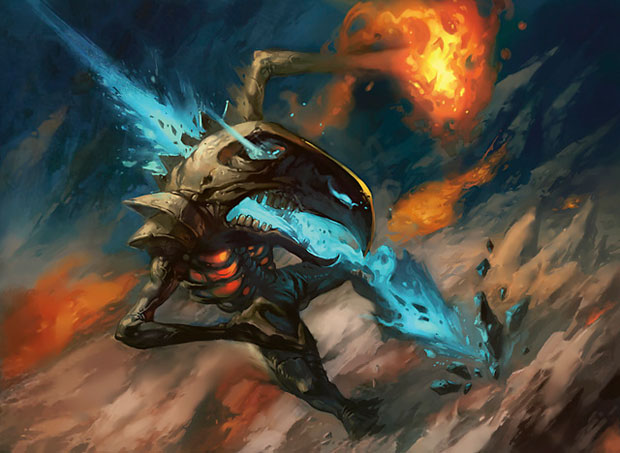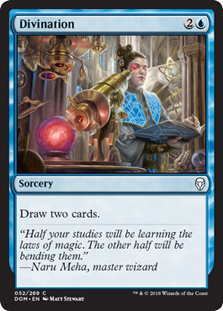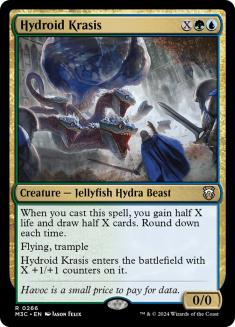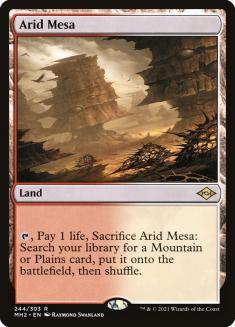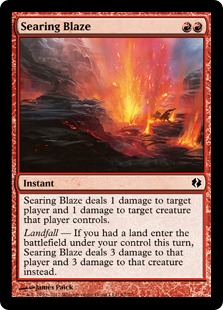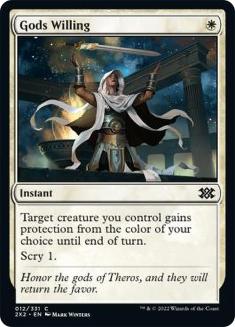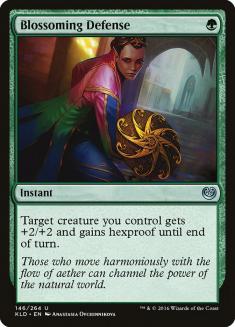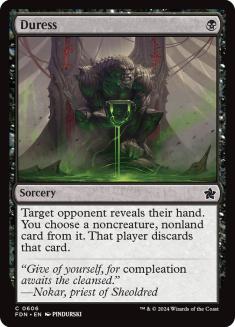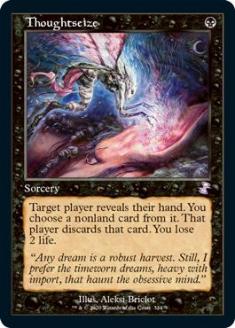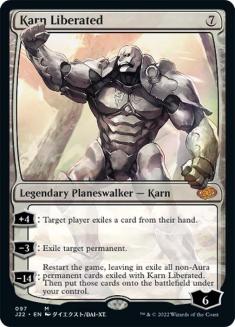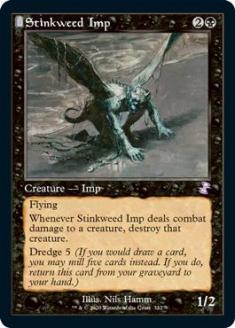One of the most common questions I’m asked from newer players is how best to level up their game. It’s such a broad question that I’m generally forced to answer with the banal cliches of “practice more,” “find better players to practice with,” and so forth. But there’s a part of this question that I find interesting, and it’s what exactly separates the best in the world from your average store-level player.
Those same cliches hold true here. The best players are putting in more hours and consulting in teams with other top players so they can break through their ingrained biases, but the differences don’t stop there. Oftentimes, when I’m watching someone play, I’m looking for how polished their technical play is. Small things like consistently tapping their mana correctly, even if it doesn’t matter, and sequencing to maximize their mana or avoid taking damage from their lands are indicative of a player with polish to their game.
Now you shouldn’t get too down on yourself if you make sloppy mistakes like this, because each one isn’t significant on its own, but if you want to ascend to the upper echelons of competitive play, not giving up these small edges adds up over time. You’d be surprised how many games of Magic come down to who spewed the least amount of value with sloppy technical play. And there are a few of these spews I see time and time again. So, in no particular order, here are the five most common small mistakes I see players make:
1. Holding Lands as a Bluff
Bluffing in general is among the most overrated tactics in Magic, and this is the most common bluff I see players run. It’s usually in a game that’s going long, when both players are light on resources. You draw a seemingly useless land and think to yourself: I guess I’ll just hold this and my opponent might think I have something.
The problem with this line of thought is, in this late-game situation, you’re going to cast any relevant card you draw. And even if you’re a counterspell deck, unless your opponent is very far ahead, they’re still heavily incentivized to cast their spells. The opportunity cost of sacrificing value into such a bluff is simply too high, because each turn could bring a game-changing topdeck.
There’s very little chance of gaining any value here against better players because they will either see through it or reason that they can’t play around a potential topdeck. There’s also little value to be gained against the weakest players, since they aren’t savvy enough to pick up on a bluff of any kind. It’s a narrow range of skill that will fall victim here, so I typically expect players who do this habitually to fall into that range.
Such players typically justify the play by saying they aren’t giving anything up to hold a couple of lands, but there are plenty of cards that will punish you here. Most notable is any card draw spell. If you hit a land off a Divination but are short of casting the spell you draw, you’ve lost important tempo. Spells with an X in the mana cost are another example.
Now, playing out your lands should be seen as the default case. That is not to say that it’s always correct to play them out. Cards like Faithless Looting and other similar effects can let you turn those lands into valuable spells, and holding a land for Tireless Tracker could be worth an extra card. What you should be doing is thinking about your deck before the tournament, weighing all the potential topdecks in these scenarios, and figuring out what your default play should be.
But if you’re unsure what to default to, I’d start playing your lands.
2. Using Fetchlands Purely for Deck Thinning
When fetchlands were first printed in Onslaught, there was a long discussion in the Magic community on the value of deck thinning. The general consensus at the time was that it’s not worth the life loss. That’s why you don’t see them in monocolored decks that don’t otherwise want to put cards in their graveyard for cards like Tarmogoyf or Grim Lavamancer.
Yet still, I see players time and time again aggressively activate their fetchlands with no other reason than to thin their deck. And once again, the value gained from such an action is minuscule, while the number of punisher cases is higher than you might think. Brainstorm in Legacy is the most known example, but there’s also the aforementioned Tireless Tracker, any sort of landfall effect, or even Mishra’s Bauble, which with the help of a fetchland can offer a free scry. Even in a deck like Burn in Modern, which often needs to topdeck the last few points of damage, holding a fetchland is advisable in order to maximize Searing Blaze.
Manipulating your library can be a very powerful effect and nearly every competitive deck has a way to take advantage of doing so. Therefore, it makes sense to hold on to that ability to shuffle for as long as possible.
But even without any such payoff, saving yourself a life point or two is more valuable than the minuscule improvement on your draw steps. It’s not necessarily just the games where your opponent has exactly lethal damage that are affected by a single life point. By throwing it away, you can put yourself in a position to chump block a turn earlier or hold back because you’re behind in the race. These situations won’t always come up, but when they do, you’ll be happy to leave that fetchland uncracked when the mana is unnecessary.
I essentially value deck thinning at zero, only doing so in the obvious situations where the game has come down to a single topdeck. And that valuation is common among more experienced players.
3. Always Using Instants on the Opponent’s Turn
The value of instants is one of the first lessons new players learn. There’s a lot to be gained by waiting until the opponent’s turn to use your spells, forcing them to tap out and leave themselves vulnerable to your follow-up, or potentially blowing out their combat trick. But that lesson too often rises to the level of dogma. The value of instants comes not from always casting them on your opponent’s turn, but in having the option to do so.
That means there are times when it’s correct to cast your removal spell on your turn. They typically come up against a tapped-out opponent who might have a protection spell like Gods Willing or Blossoming Defense. There’s no reason to let them counter your removal spell if you don’t have to. If you’re using damage-based removal, then any pump spell is something to worry about.
For example, one of the common patterns against Infect in Modern is to hold up your removal spell, take their attack for one or two damage, and then put them to the test on their end step. Then when you untap you can use removal again when they’re tapped low. This forces them to have the maximum amount of protection spells and the mana to cast them in the smallest window of time. You don’t want to pass the turn again and let them untap before you fire again at their creature.
In general, my rule of thumb is this: If I plan on using a removal spell before combat damage, and it’s unlikely my opponent makes a relevant game action before attacking, I should just resolve the spell while I can. Of course, if all their mana is untapped, that means casting it in their upkeep because I’d rather they respond and use mana on their turn. But if their mana is tapped low, then playing on my turn is best.
Every situation is different, but it’s important not to get locked into the default too often. Put some time into thinking about how to time your spells, and you’ll start to see times when deviating from the norm is correct.
4. Playing Scared
As a devotee of combo decks, this one hits close to home. No one likes the feeling of casting your key spell and getting it countered, leaving you with nothing left. The game drags on for a bit from there, but you’re no threat to win and soon pack up your cards. So instead you hold back, hoping for a key discard spell or a window where your opponent foolishly taps out.
But five turns later, no such situation materializes, so you resign to casting your spell anyway, and meet the same fate. Little did you know that your opponent drew the counterspell the previous turn, and your fear gave them the time to find it.
Of course, there are times when you draw the discard or counterspell to backup your game-winning play, but the former situation is significantly more likely than the latter. At least it is given how often players play scared, especially with linear decks. And the dream of having your opponent tap out and give you a free window when they have the means to stop you is just that, a dream.
When you’re in this kind of situation, when you’re on your last gasp and need a certain spell or creature to carry you, it’s not always right to play around a potential answer. You must ask yourself how likely it is for the game to get better for you. While every turn gives you a draw step to find protection, it gives your opponent a draw step to find another answer. I generally need to have other ways to dig through my deck to want to wait, like Preordain or Brainstorm in Storm in Legacy.
But when things are looking bleaker, then your best bet is to jam and hope they don’t have it. The same principle applies to non-combo decks as well. When playing Izzet Ensoul in Pioneer, I’ll often cast an Ensoul Artifact or Skilled Animator into open mana if I think I need to get lucky and have it stick right now in order to win.
When you think about it, if the game has gone poorly enough that you’re relying on one card to win it, your opponent will play around that card to the best of their ability. So unless you have a lot of looks for a counter to their answer, your highest chance for success comes from casting it as soon as possible and cutting your opponent off of draw steps to find that answer.
5. Not Mulliganing Enough
This is likely the most controversial, especially because there are plenty of great players who have a wide range when it comes to keeping. It’s also one I’ve changed on in the last year. I used to have a wider range. But the London Mulligan ushered in a new world.
You’ve never had a better chance of curving out with a six- or five-card hand or finding your key sideboard cards as you do now. And with the way cards are designed these days, casting your powerful cards on curve is more important than having an extra card or two. This is especially true in synergy-driven decks like Izzet Ensoul in Pioneer or Rakdos Sacrifice in Standard.
I’ve gotten into the habit of mulliganing the majority of hands that even give me serious pause, since that pause typically comes from the hand having a major flaw. In Magic in 2020, your medium hands get run over far too often to be reliable keeps. And with that comes rooting for the opponent to keep when they are tanking on a hand, knowing that I’d rather they start on a mediocre seven than find a good or great six.
Most of the hype around the rule change came from decks like Mono-Green Tron and Dredge that like to mulligan aggressively and are helped the most by being more consistent on the early turns of the game, but the London Mulligan has helped everyone, and you should be taking advantage of it more often.
Unfortunately, there’s no easy fix to any of these issues. They all require breaking bad habits and developing good ones. But beyond that, in order to polish away the rust and level up your play, you need to learn to recognize the many corner cases that arise in a game of Magic. And that polish only comes from putting in the necessary reps.
Much like developing your skill at a given sport is about building muscle memory, polishing your technical play in Magic is about reducing these decisions to instinct so that you can focus your mental energy on the more complicated aspects of the game, like deducing what’s in your opponent’s hand and analyzing several plays on a complicated battlefield.
The value of instants comes not from always casting them on your opponent’s turn, but in having the option to do so.
Even though the best way to polish your game is simply putting in the hours, my goal here is to provide you all with a few examples of things to watch out for, so that you can progress more quickly. Few players have the privilege of playing for 25 or more hours a week, but by being more cognizant of these things, you can play like you do.
I guess the best way to answer the initial question of what separates the great players from the good is that the great players have a firm command of the details. They know what the default plays in these situations should be, but also recognize where the holes in those plays lie and thus when to deviate from those defaults. And plugging these same holes in your own game will go a long way towards bridging that gap.

